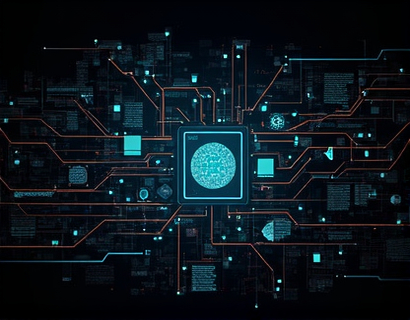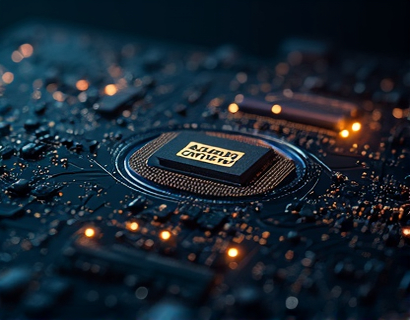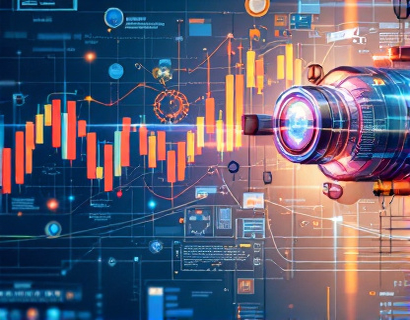Next-Gen Digital Transformation: Harnessing Crypto and AI for Innovative Solutions
The digital landscape is undergoing a profound transformation, driven by the convergence of cryptocurrency and artificial intelligence. This fusion is giving rise to innovative applications that are redefining user experiences and setting new standards in technology. For tech enthusiasts, digital marketers, and early adopters, understanding this synergy is crucial to staying ahead in a rapidly evolving market. This article delves into the ways crypto and AI are merging to create advanced solutions, connecting businesses and tech-savvy individuals with cutting-edge applications.
The foundation of this digital revolution lies in the unique properties of cryptocurrency. Beyond being a digital currency, cryptocurrencies like Bitcoin and Ethereum offer decentralized, secure, and transparent systems. These properties are not only transforming finance but also serving as the backbone for a new generation of decentralized applications (dApps). The blockchain technology underlying cryptocurrencies ensures that transactions are immutable and tamper-proof, providing a level of trust and security that traditional systems often lack.
Artificial intelligence, on the other hand, brings the power of machine learning, natural language processing, and predictive analytics to the table. AI can process vast amounts of data, identify patterns, and make decisions with minimal human intervention. When combined with the decentralized and secure nature of blockchain, AI can operate in a trustless environment, enhancing its capabilities and expanding its applications.
Decentralized Applications: The New Frontier
One of the most significant outcomes of merging crypto and AI is the development of decentralized applications. dApps leverage blockchain to create platforms that are not controlled by any single entity, offering users greater autonomy and control over their data. These applications can range from decentralized finance (DeFi) platforms to social media networks and gaming environments.
In the realm of finance, DeFi platforms are redefining traditional banking by providing lending, borrowing, and trading services without intermediaries. AI algorithms can optimize these services by analyzing market trends, predicting price movements, and automating trades. This combination not only enhances efficiency but also reduces costs and increases accessibility for users worldwide.
Social media platforms built on blockchain can ensure user data privacy and ownership. AI can enhance these platforms by curating content based on user preferences, detecting and filtering misinformation, and facilitating more meaningful interactions. The decentralized nature of these platforms also means that users have more control over their data and can monetize their engagement in novel ways.
Enhanced User Experiences through AI-Driven Personalization
AI-driven personalization is another area where the integration of crypto and AI is making a significant impact. By analyzing user behavior and preferences, AI can tailor experiences to individual needs, providing a more engaging and relevant interaction. In the context of blockchain, this personalization can be enhanced by ensuring that user data is securely stored and managed, giving users more confidence in sharing their information.
For instance, in the e-commerce space, AI can recommend products based on a user's browsing and purchasing history. When combined with blockchain, this process can be made more transparent and secure, ensuring that user data is not misused. Cryptocurrencies can also facilitate seamless and secure transactions, reducing friction and enhancing the overall shopping experience.
In the realm of content creation and consumption, AI can help creators produce and distribute content more effectively. Blockchain-based platforms can reward creators directly, ensuring fair compensation for their work. AI can further assist by analyzing audience engagement, optimizing content for better reach, and even generating content through advanced algorithms. This synergy not only benefits creators but also provides users with a richer and more diverse content ecosystem.
Supply Chain Optimization with Blockchain and AI
Supply chain management is another sector that stands to gain immensely from the integration of blockchain and AI. Traditional supply chains are often plagued by inefficiencies, lack of transparency, and fraud. Blockchain provides a tamper-proof ledger that can track products from origin to destination, ensuring authenticity and reducing counterfeiting.
AI can enhance these systems by analyzing data from various points in the supply chain, predicting bottlenecks, and optimizing logistics. For example, AI algorithms can forecast demand, manage inventory levels, and streamline transportation routes. When combined with blockchain, this data is secure and verifiable, building trust among all stakeholders involved.
A practical application of this is in the food industry, where blockchain can trace the journey of produce from farm to table. AI can monitor conditions such as temperature and humidity, ensuring that food remains safe and fresh. This level of transparency not only benefits consumers but also helps businesses comply with regulatory requirements and maintain their reputation.
Cybersecurity: A Stronger Defense with Crypto and AI
Cybersecurity is a critical concern in the digital age, and the combination of blockchain and AI offers robust solutions. Blockchain's decentralized and cryptographic nature makes it inherently secure against many types of cyber attacks. AI can further bolster security by detecting and responding to threats in real-time.
AI-powered security systems can analyze network traffic, identify anomalies, and predict potential attacks before they occur. These systems can also adapt to new threats, continuously improving their defenses. When integrated with blockchain, this creates a multi-layered security approach that is difficult for attackers to compromise.
For businesses, this means a stronger defense against cyber threats, protecting sensitive data and maintaining customer trust. For individuals, it translates to a safer online environment where their personal information is better protected. The synergy between crypto and AI in cybersecurity is a game-changer, setting a new standard for digital security.
Challenges and Considerations
While the potential of combining cryptocurrency and AI is vast, there are challenges that need to be addressed. One of the primary concerns is the regulatory landscape. As these technologies evolve, governments and regulatory bodies are still grappling with how to govern them. Businesses and developers must stay informed about regulatory changes to ensure compliance and avoid legal pitfalls.
Another challenge is the technical complexity involved in integrating blockchain and AI. Developing robust and scalable solutions requires expertise in both domains. Collaboration between tech experts, legal advisors, and industry stakeholders is essential to overcome these hurdles.
Additionally, there is the issue of scalability. While blockchain offers many benefits, it can be slow and resource-intensive, especially when handling large volumes of transactions. AI algorithms, particularly those requiring extensive training, can also be computationally demanding. Innovations in blockchain technology, such as layer 2 solutions and more efficient consensus mechanisms, are necessary to address these scalability concerns.
Future Prospects: The Road Ahead
The future of digital transformation through the integration of cryptocurrency and AI is promising. As technology continues to advance, we can expect more sophisticated and user-friendly applications. The convergence of these technologies will likely lead to the development of new industries and business models that we can hardly imagine today.
For tech enthusiasts and early adopters, staying informed and engaged with these developments is key. Participating in communities, attending conferences, and experimenting with prototypes can provide valuable insights and opportunities. For businesses, embracing these technologies can open up new markets and create competitive advantages.
In conclusion, the fusion of cryptocurrency and AI is not just a technological trend but a fundamental shift in how we approach digital innovation. By harnessing the strengths of both domains, we can create advanced applications that enhance user experiences, optimize processes, and build a more secure and transparent digital world.










































